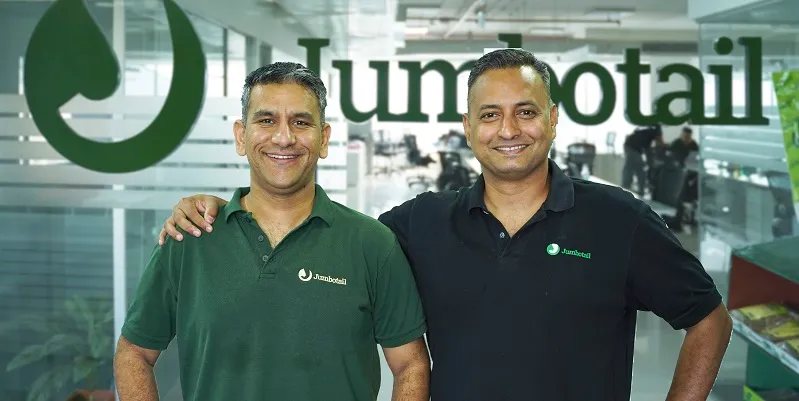How Jumbotail co-founders are changing the way grocery is bought and sold in India
In this episode of the 100X Entrepreneur podcast, Ashish Jhina and Karthik Venkateswaran talk about their journey as entrepreneurs, launching Jumbotail, and more.
Third generation apple farmer Ashish Jhina and military veteran Karthik Venkateswaran co-founded online wholesale marketplace , aiming to change the way food and grocery are brought and sold in the country.
“Agriculture is one of the few industries in this country where production happens without necessarily knowing what demand exists, and that is actually the root of a lot of issues... We were talking about what we wanted to do with our lives, so so we decided to figure out if there is a way to solve this problem using things that we are familiar with, such as technology, operations, use of data, ecommerce, and that’s how we ended up starting Jumbotail,” Ashish says.

S Karthik Venkateswaran (R) and Ashish Jhina (L), Co-founders, Jumbotail [Image Credit: 100X Entrepreneur Podcast]
Founded in 2015, Jumbotail is an online wholesale marketplace for grocery and food items. At present, the startup serves over 30,000 neighbourhood or kirana stores across India with its full-stack B2B ecommerce model.
Its model includes warehouses, a last-mile delivery supply chain network, and a fintech platform for payment and credit solutions to store owners.
In this episode of the 100X Entrepreneur podcast, co-founders Ashish and Karthik talk about their journey as entrepreneurs, launching Jumbotail, and more.
Journey to entrepreneurship
Karthik believes that an experience in the Armed Forces can make people entrepreneurial.
“I think Armed Forces definitely makes you entrepreneurial because, in almost all places, the situation dawns upon you, and you need to actually make decisions in split seconds, and you have to motivate people to achieve the mission and vision,” he explains.
Karthik says, to him, an entrepreneur is not just a person who launches a company. He adds if entrepreneurship is broken down, it involves several small steps such as having certain principles, having a vision, and motivating others to join the cause.
On the other hand, Ashish, who comes from an agricultural background, got exposed to the problems of the sector early on.
“Every Indian is a consumer, but a large part of the country is also actually involved in production. We wanted to change the way food and grocery were bought and sold in this country. For me, you know, this is a problem that I have had personal exposures,” he says.
Business growth
The co-founders claimed that 50,000 retailers are registered on the Jumbotail platform, and the startup has begun its scaling-up journey.
“Bengaluru used to be our largest market until about two months ago. So, post completing the $25 million fundraise, we are expanding across south India, and bringing our platform to north India in Bihar, Jharkhand, Uttar Pradesh, Himachal Pradesh, Ghaziabad, Uttarakhand, and Jammu to Tier III and IV towns,” Kartik says.
The founders also revealed that by the end of 2021, the startup aims to cross $250 million in terms of revenue.
To know more, listen to the podcast here.
Notes:
02:44 – Karthik and Ashish’s backgrounds as a Major in the Indian Army and apple farmer, respectively
08:55 – First principle thinking applied at Jumbotail
13:57 – Core engineering principle: Build for utility, not for the use case
19:24 – Problem statements solved by Jumbotail for kiranas (grocery retailers)
23:18 – Capital cannot be an only moat, where “unit economics” are extremely difficult to figure out
24:32 – Rapid scale-up, pushing towards $250 million
27:25 – Raising first funding from Nexus Venture Partners
38:16 – Identifying your co-founders at a mature-career stage
Edited by Suman Singh








